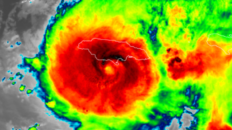In the United Kingdom each year 60,000 people suffer a sudden cardiac arrest outside hospital. Approximately half of these (30,000 people) receive a resuscitation attempt from the ambulance service, however the recovery rate remains disappointingly low with only 9% surviving to leave hospital.
Improving survival rates
The key to improving survival rates in cardiac arrest is public awareness of the problem and rapid action if a cardiac arrest occurs. Whenever a cardiac arrest is suspected 999 services should be contacted immediately and chest compressions started to maintain the flow of blood around the body, thereby supplying oxygen to the brain for vital minutes.
In about one third of patients with cardiac arrest resuscitated by ambulance services, the heart can be restarted with an electric shock from a defibrillator. Public access defibrillators are becoming increasingly common sights around the country, and can now be found in town centres, shops, railway stations, and other public places.
On the 16th of October each year the Resuscitation Council UK hosts “Restart a Heart Day”. This important event is designed to raise awareness of cardiac arrest and the need for immediate bystander action to commence cardiopulmonary resuscitation (CPR) and secure early use of a public access defibrillator, whenever one is available, to increase the chances of survival.
Throughout my medical career as a doctor working in the Accident and Emergency Department of the Bristol Royal Infirmary, and with the South Western Ambulance Service on the Great Western Air Ambulance, I have attended many patients in cardiac arrest. And whilst advanced medical care is important once the heart has been restarted a successful outcome depends on getting the basics right from the very start.
When a patient becomes suddenly unconscious due to cardiac arrest, they may continue to breathe for a short time in a slow, gasping, or noisy fashion. This early abnormal breathing can cause confusion but whenever a patient is unconscious and not breathing normally, cardiac arrest should be assumed, 999 services are to be contacted immediately, CPR should be started, and a defibrillator should be brought to the patient for use by bystanders or ambulance service responders as soon as possible.
Resuscitation training to deliver CPR has historically included rescue breathing (“mouth-to-mouth”), but this is not necessary for untrained responders who should focus on chest compressions alone to keep blood flowing to the brain. Where these events come together survival rates can exceed 40%, and this is achieved in some countries, however we have a long way to go to make this level of successful survival a reality in the UK.
Saving Lives
Alongside my clinical practice, I’m proud of the work that colleagues in NHS Digital are doing to improve the recognition and response to out of hospital cardiac arrest and support public action to save lives. The NHS Pathways Clinical Decision Support System (CDSS), provided by NHS Digital, underpins all NHS 111 services and half of the 999 ambulance services in England.
CDSS plays a vital role in ensuring that trained health advisors and clinicians provide safe and accurate care over the phone, including in instances where patients are suffering from suspected cardiac arrest. NHS Pathways is designed to recognise and respond with the utmost urgency to any patient who may be in cardiac arrest.
Over the past year, NHS Pathways has identified nearly 20,000 suspected cardiac arrest patients and ensured that they receive the fastest possible ambulance response. In addition, and whilst waiting for the ambulance to arrive, members of the public are supported to commence effective CPR, buying vital time, and substantially increasing the chance of a successful outcome.
The NHS Digital team trains staff in using the NHS Pathways CDSS, and constantly reviews and revises the system to ensure that it is fully up-to-date, and that the instructions given ensure patients receive the best possible care.
NHS Digital has also become involved in helping to train the wider public in CPR skills on Restart a Heart Day, and we will continue to do all we can to reduce the mortality from this sudden and deadly condition by supporting NHS staff and citizens to recognise and respond to cardiac arrest, thereby working together to save lives.
First published by National Health Executive on 16 October 2021.
Share this page
Latest blogs
Last edited: 24 March 2022 7:52 am
Source: digital.nhs.uk







 Please wait...
Please wait...
Add comment